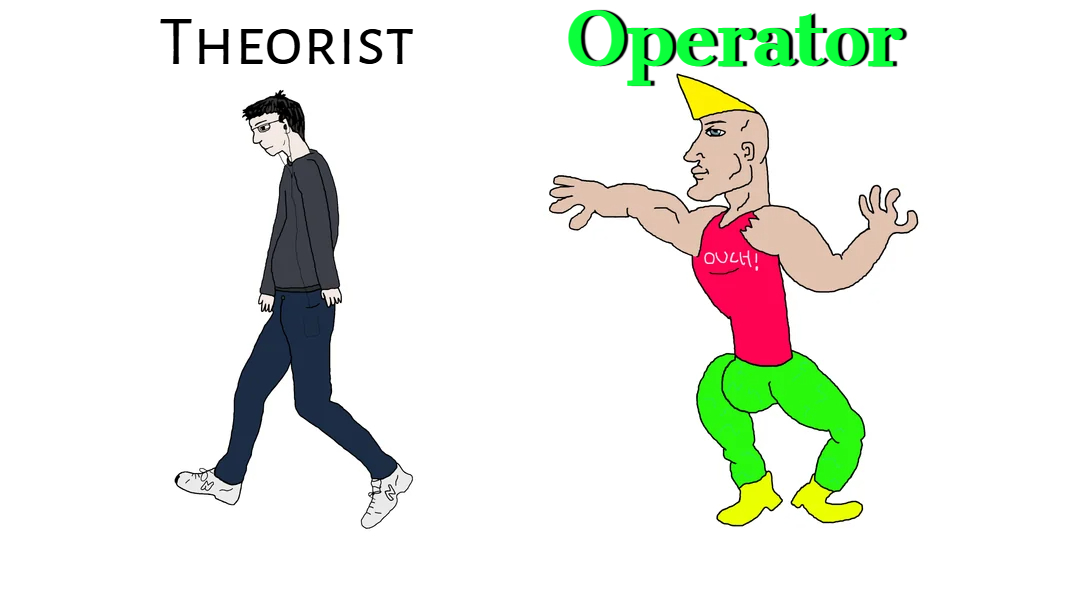Alexanderr

Admin
- Joined
- Mar 5, 2019
- Posts
- 22,481
- Reputation
- 48,108
Let's follow two guys, Alex and Mark. They represent two fundamentally different approaches to achieving success. We'll run them through three common scenarios.

Scenario #1 - The Goal: Start an online business.
Alex (The Theorist):
For three solid months, Alex is in deep "research mode." He falls down a YouTube rabbit hole of "how to find the perfect unsaturated niche." He writes a 20-page business plan, complete with five-year financial projections. He spends weeks obsessing over the perfect logo and building a flawless Shopify store, agonizing over fonts and color palettes. He meticulously analyzes 50 competitors until he's completely paralyzed, convinced the market is too saturated. He never launches.

Mark (The Operator):
Mark has the same goal. He spends three hours on Canva creating a few rough mock-ups of a product idea. He posts them to his Instagram story with a simple poll: "Which one of these would you actually buy?" He takes the winning design, finds a supplier, and spends $50 on a targeted ad campaign that links to a bare-bones pre-order page. He doesn't care if it's perfect; he cares if someone will pay for it.

Scenario #2 - The Goal: Land a competitive internship or job.
Alex (The Theorist):
Alex spends weeks polishing his resume into a work of art that no human will ever read for more than six seconds. He writes a generic but "optimized" cover letter. He then sits back and mass-applies to 200 job postings online, firing his resume into the digital void and hoping an algorithm blesses him.

Mark (The Operator):
Mark identifies 5 companies he actually wants to work for. He researches, finds the name of the department head, and locates the office address. He prints a concise, one-page proposal; not a resume, but a direct value proposition: "Here's a problem I see you have, and here's how I would start solving it." He puts on a decent shirt and physically goes to the office. He asks the receptionist to get it directly into the manager's hands.

Scenario #3 - The Goal: Make money investing in crypto.
Alex (The Theorist):
Alex spends months becoming an expert spectator. He watches hundreds of hours of analysis on YouTube, reads whitepapers, and can debate the nuances of tokenomics for hours. He is so terrified of making the "wrong" move that he keeps all his money in cash, waiting for the "perfect," risk-free entry point that will never come.

Mark (The Operator):
After some initial research, Mark invests a small, non-critical amount of money; a few hundred dollars. He immediately experiences the gut-wrenching feeling of a 20% drop and the euphoria of a 30% gain. He learns firsthand, under pressure, about gas fees, wallet security, and the emotional discipline required to not panic-sell.

So what's the difference?
It's not intelligence. It's their operating system. Mark runs his life on one principle:
Action is the highest bandwidth form of information available.
This why no one can sell you a formula for success. They can only sell you their story, their map. The territory must be walked alone.
Theorists compound theory. Operators compound results.

Reality doesn't care about your plans. It only cares about your actions. An Operator's loop is ruthless: Act. Get Data. Calibrate.
Stop studying. Start walking. Here’s your playbook:

Scenario #1 - The Goal: Start an online business.
Alex (The Theorist):
For three solid months, Alex is in deep "research mode." He falls down a YouTube rabbit hole of "how to find the perfect unsaturated niche." He writes a 20-page business plan, complete with five-year financial projections. He spends weeks obsessing over the perfect logo and building a flawless Shopify store, agonizing over fonts and color palettes. He meticulously analyzes 50 competitors until he's completely paralyzed, convinced the market is too saturated. He never launches.
- Result: 3 months wasted. He has zero sales, zero real-world data, and a folder full of sophisticated guesses. He feels like he's been productive, but he's still on the starting line.

Mark (The Operator):
Mark has the same goal. He spends three hours on Canva creating a few rough mock-ups of a product idea. He posts them to his Instagram story with a simple poll: "Which one of these would you actually buy?" He takes the winning design, finds a supplier, and spends $50 on a targeted ad campaign that links to a bare-bones pre-order page. He doesn't care if it's perfect; he cares if someone will pay for it.
- Result: 24 hours later, he has the only verdict that matters: the market's wallet. He has 3 pre-orders, real data on his cost-per-acquisition, and knows which design converts. He's in the game, learning from reality

Scenario #2 - The Goal: Land a competitive internship or job.
Alex (The Theorist):
Alex spends weeks polishing his resume into a work of art that no human will ever read for more than six seconds. He writes a generic but "optimized" cover letter. He then sits back and mass-applies to 200 job postings online, firing his resume into the digital void and hoping an algorithm blesses him.
- Result: He's just another PDF in a digital pile of a thousand others. His fate is in the hands of a faceless HR department. His strategy is passive hope, and he has no data on why he's being ignored.

Mark (The Operator):
Mark identifies 5 companies he actually wants to work for. He researches, finds the name of the department head, and locates the office address. He prints a concise, one-page proposal; not a resume, but a direct value proposition: "Here's a problem I see you have, and here's how I would start solving it." He puts on a decent shirt and physically goes to the office. He asks the receptionist to get it directly into the manager's hands.
- Result: He probably gets turned away by security 4 out of 5 times. But that one time, his sheer audacity bypasses every digital filter and creates a story. He is no longer a PDF; he is a person who takes tangible risks and creates his own opportunities.

Scenario #3 - The Goal: Make money investing in crypto.
Alex (The Theorist):
Alex spends months becoming an expert spectator. He watches hundreds of hours of analysis on YouTube, reads whitepapers, and can debate the nuances of tokenomics for hours. He is so terrified of making the "wrong" move that he keeps all his money in cash, waiting for the "perfect," risk-free entry point that will never come.
- Result: He has immense theoretical knowledge but has captured zero gains. The market moves without him while he rots in analysis paralysis.

Mark (The Operator):
After some initial research, Mark invests a small, non-critical amount of money; a few hundred dollars. He immediately experiences the gut-wrenching feeling of a 20% drop and the euphoria of a 30% gain. He learns firsthand, under pressure, about gas fees, wallet security, and the emotional discipline required to not panic-sell.
- Result: He has real skin in the game. His knowledge is now visceral, not academic. He's learning more from one week of direct market feedback than Alex has in months of passive observation.

So what's the difference?
It's not intelligence. It's their operating system. Mark runs his life on one principle:
Action is the highest bandwidth form of information available.
This why no one can sell you a formula for success. They can only sell you their story, their map. The territory must be walked alone.
Theorists compound theory. Operators compound results.

Reality doesn't care about your plans. It only cares about your actions. An Operator's loop is ruthless: Act. Get Data. Calibrate.
Stop studying. Start walking. Here’s your playbook:
- What's my guess?
- What's the smallest, fastest, cheapest experiment I can run today to test it?
- What data will that action give me?











